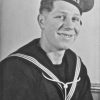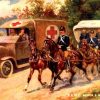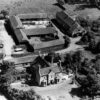
One of the more puzzling entries in Overseers of the Poor Accounts for Bottesford is a payment of a substantial sum of money for a sailor. In April 1795 the Overseer, John Kettleborow, includes amongst the routine sums paid for children, coals and warrants, a large payment to ‘Mr Brown and the seaman’ in Leicester. It covers not only expenses and wages, but, surprisingly, ‘Liquer and Ribbands’.

Payment for a Seaman
Overseers Accounts for Bottesford 1795
The nearest port to Bottesford, Boston, is some 40 miles away. While there may have been some natives of Bottesford serving in the Merchant or Royal Navy, this seaman is unnamed, as though he is not individually known to the Overseers. The Overseers did sometimes give Poor Relief to sailors in need and their dependents, but this payment is clearly something altogether different.
Perhaps this is a case of the removal of a man without a Settlement Certificate. There is an earlier reference to a warrant of removal, but if this seaman was the subject of a removal warrant it seems most unlikely that the Overseers would have been willing to add the cost of ”Ribands’ to already heavy removal expenses. A later entry in the accounts shows that in addition to the levy of 1s 6d in the pound, raising a total of £109 7s 9d, another levy of 6d in the pound was required to raise £36 9s 3d ‘for the seaman ‘.

Extract from the Overseers of the Poor accounts for Bottesford, 1795
In 1793 France declared war on Britain.The armed forces had to be greatly enlarged. In the period surrounding the French Revolution the British Government became increasingly fearful of the spread of radical ideas in Britain. Repressive legsilation was introduced. Under the Militia Acts each county was required to furnish a quota of men for the local Militia, apportioned among the various parishes, but these were primarily regarded as a civil defence force to supress domestic unrest. Britain’s most important defence against the French was the navy. The supply of new recruits through volunteering or impressment was inadequate and in March 1795 the Quota Acts were passed, obliging magistrates to find a specified quota of men to serve in the Royal Navy.
Sailors at the time were regarded both as heroic ‘hearts of oak’ and ‘jolly tars’. In his memoirs Robert ‘Landsman’ Hay depicts Jack Tar ‘with his white dimity trousers fringed at the bottom, his fine scarlet waistcoat bound with black ribbon, his dark blue broadcloth jacket studded with pearl buttons, his black silk neckcloth thrown carelessly about his sunburnt neck.’ Sailors were known to be fond of adorning their hats and clothes with ‘Ribands.’ They were also known for their drinking. A sailor’s ration of alcohol at sea was one gallon of beer or a pint of wine or half a pint of spirits, depending on what was available. While the earlier payment shown for drink is ‘Norman liquer 1s’, the seaman is paid 2s 6d, though of course we do not know what period of time this covers.
The extra levy raised, amounting to about a third as much as the main levy for the support of the poor for the whole village, was probably Bottesford’s promp, patriotic response to the Quota Act. The ‘seaman ‘ would not have been a man from Bottesford, but would have been paid as a substitute to fulfil the quota.

A British Sailor
Isaac Cruikshank,
1790









No Comments
Add a comment about this page